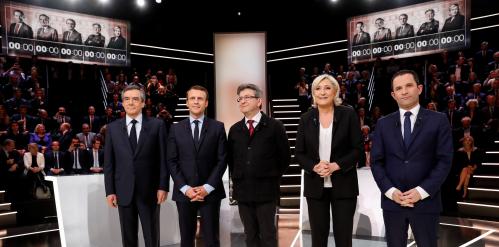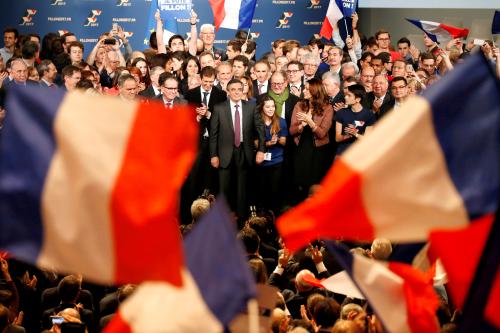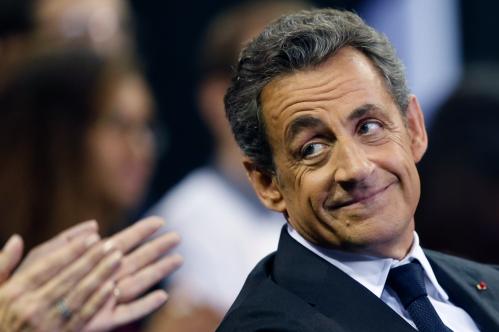The electoral season is in full swing in France, ahead of a critical presidential election set for May 7, 2017, to be followed by parliamentary elections in June. Thanks to a primary system recently introduced by both center-left and center-right mainstream parties, the French people are being treated to a U.S. style-extended election season, including some elements of surprise. The first one came last Sunday, in the Republican party primary’s final round, when former prime minister François Fillon, 62, became his party’s presidential nominee, winning 66.5 percent of the votes against 33.5 percent for Alain Juppé, his opponent.
This outcome was unexpected: for the past two years, the favorite had been 71-year old Juppé, another former prime minister and foreign minister, and a man considered by many as an heir to the all-inclusive Gaullist tradition. As mayor of Bordeaux since 1995, he made the city more international than ever. Fillon, in contrast—who comes from the quiet rural region of Sarthe, 200 miles west of Paris—represents a more “traditional France”: overwhelmingly white, and ingrained in its provincial and Catholic roots. While the Western media has tended to depict Fillon as a “French Margaret Thatcher” and ”free-marketer,” he is also deeply conservative.
This was the result of an unprecedented mobilization of voters in conservative provincial France, which is less multicultural and diverse than the one Juppé—or any center-left candidates—evoked. (Socialist President François Hollande, for his part, is expected to inform the country about his candidacy on December 4.) Many of the 2.6 million voters who supported Fillon in the primary belong to a certain type of political right, which had been sidelined for many years. “The first condition of national recovery is the respect of our past, in accepting our history and recognizing our heroes” he said in a major speech in his 12,000-person hometown of Sablé-sur-Sarthe last August. Fillon has complained that the content of French history books “do not reflect what it is to be French.” He is also personally opposed to abortion, although he said he would not seek to repeal the current law if elected president.
Since 2012, many conservative voters have felt detached from and disenfranchised by the current center-left government, which has championed gay rights and tried to reform history books (drawing Fillon’s ire) in public schools. In 2013, half a million French people—many of them coming from the more rural regions—took to the streets of Paris, Nantes, and Lyon under the banner “manif pour tous” (protest for everyone) as a response to Hollande’s “marriage pour tous” (marriage for everyone).
The 2017 presidential election is an opportunity for traditionalists to move back to center stage. Unlike Juppé—who has said he wants to ease tensions—Fillon indirectly offers to restore a French society for those who feel neglected by a growing urban multiculturalism advocated by elites who think France could benefit more from globalization. Many French people simply don’t feel that way. Sociologist Denis Pelletier calls this “the return of the patrimonial right,” another name for a group that thinks it has an exclusive right to run the nation’s affairs, economically and politically. This includes traditional Catholics, who believe Christian values have modeled France and should therefore be reinstated, especially at a time of increasing multicultural tensions.
In many regions of France, people have not adapted well to globalization.
In many regions of France, people have not adapted well to globalization. Like in other parts of the Western world, they feel elites have not represented their views. Unlike those who—in other countries—have opted for populist leaders, these French citizens have found a new champion who they think is reflecting their views. Rather than vote for outside-the-beltway (and outside the political norm) candidates like Donald Trump, they found Fillon. This is not good news for the far-right Front National (FN), which plays on people’s fears of immigrants. While the FN’s share of the vote has been rising steadily, only a portion of the French electorate is radical enough to support the far right. And Marine Le Pen is different from her 88-year father Jean-Marie, who represented the most extreme version of racist and nationalist views in French politics. In many ways, he alienated a number of moderate voters, many of them with Christian values. Even though Jean-Marie’s daughter Marine has shifted her party to the center since being elected leader in 2011 (for example, her right-hand man Florian Philippot is openly gay), most French conservatives do not associate or identify with the FN.
François Fillon, who wants to reform France’s broken social model, also plans to cut state spending and to slash 500,000 public sector jobs. But chances are that he will continue to advocate traditional values, enhancing the possibility that he’ll gather more votes than any center-right politician since Nicolas Sarkozy (who, after coming in 3rd place in the primary’s first round, has said he will support Fillon). The Republicans’ new champion also has a message for Marine Le Pen that appeals to the center-right: France needs less, not more, extremism in French politics. Will the French public go for Fillonism instead? The real race is only just beginning.







Commentary
Facing anti-establishment sentiment, French Republicans find their own answer in traditional values
November 30, 2016